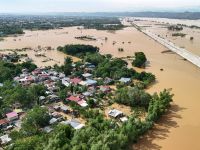Palestinian Authority security forces have closed down six offices of Hamas group, as Palestinian President Yasser Arafat attempts to make good on his promise to clamp down on militant activity.
The operation was carried out Tuesday by some 30 Palestinian police officers, preventative security and intelligence forces, some of whom wore black ski masks to hide their identity as press photographers snapped pictures.
And late Tuesday, a high-ranking Palestinian security official said the Palestinian Authority arrested eight renegade members of its Gaza Strip security and police branches who were not committed to the ceasefire.
The United States meanwhile kept up the pressure on Arafat to quell the violence, but as tensions appeared to calm urged Israel to resume direct talks with the Palestinians.
While demanding more from Arafat, US officials also implicitly called for Israel to pull back on its declaration last week that the Palestinian President is "irrelevant" and its decision to cut ties with the Palestinian Authority.
Secretary of State Colin Powell delivered the US message in phone calls to Arafat and Israeli Prime Minister Ariel Sharon in which he stressed the importance of restarting security talks that had foundered amid an escalation of Palestinian attacks and Israeli reprisals in the past weeks.
The Palestinian security units padlocked the doors of buildings, including a political-planning office, a printing house publishing leaflets against the Palestinian Authority, two food storehouses and a Hamas women's committee office.
Police, armed with assault rifles, spray-painted the phrase "Closed by order of the Palestinian Authority" in bright red letters.
Officers stood with guns poised as the offices were sealed, then sped through the Gaza City streets in a convoy of five canvas-topped jeeps until they reached their next stop.
"This is Arafat's decision and everyone must abide by it," one intelligence officer told AFP at the scene.
Arafat made a televised address to the Palestinian people on Sunday calling for an end to all attacks, saying they were damaging the national interest by playing into the hands of Israeli Prime Minister Ariel Sharon, whom he accused of wanting to escalate operations against the Palestinians.
Thirty-three offices used by hard-line movements had already been closed on the order of the Palestinian Authority in the Gaza Strip over the weekend.
Two offices of the social affairs branch of Hamas were also closed in Ramallah and orders given for a third to shut.
Israeli Foreign Minister Shimon Peres said the Palestinian leader should be given a few days to crack down on extremist groups, who have said they will defy his demand for a ceasefire.
Arafat and the hardline groups are at loggerheads over how to achieve the common goal of ending Israel's occupation of large swathes of Palestinian land.
Islamic groups, led by Hamas, dismissed the call, arguing that such a move would allow Israel's right-wing government to push ahead with a "campaign of extermination" against the Palestinian people.
The secular Democratic Front for the Liberation of Palestine, one of the main components in the Arafat-headed Palestine Liberation Organization, on Tuesday also rejected the demand to halt its armed struggle against Israel.
A new poll revealed a Palestinian public unhappy with Arafat's crackdown.
The survey carried showed that 71.9 percent of Palestinians believe arresting activists is unjustifiable, while 57 percent expressed opposition to the ceasefire called for by Arafat.
Nonetheless, there was a marked drop in violence following Arafat's speech, described by a UN envoy to the region as a "potential turning point" in the nearly 15-month Palestinian uprising that has killed more than 1,100 people.
Arafat has been under massive pressure, both from the world community and from crushing Israeli air raids on his security infrastructure, to jail Islamic extremists behind a spate of bloody suicide bombings this month.
Elsewhere, Arab League chief Amr Mussa said an emergency meeting of Arab foreign ministers on the Israeli-Palestinian conflict will go ahead as planned on Thursday in Cairo, amid Arab differences over Arafat's commitment to end anti-Israel attacks.
For his part, EU Middle East envoy Miguel Angel Moratinos warned that the peace process was in tatters.
"We are facing the most dramatic, if not to say the most serious, crisis of the peace process or so-called peace process," he told reporters in Jerusalem before heading to Washington for high-level talks.
International efforts were underway to avoid the "total collapse of the peace process," he said.
Also, Iraqi President Saddam Hussein called for an emergency meeting of Arab heads of state "devoted to Israel's aggression against the Palestinians." (AFP, Gaza)
Israeli President Cuts Short Visit in Sakhnin
The Israeli President Moshe Katsav was forced to cut short his visit when hundreds of Arab residents protested it, and he ended up lunching near Acre, instead of in the city of Sakhnin in the Galilee, where the meal was planned to take place.
According to reports, local Arab protesters confronted police. Four policemen were lightly hurt and several patrol cars damaged. The injured policemen were taken to the hospital and one remains under supervision.
The demonstrators demanded that Katsav "go home" and interfered with the visit from Katsav's first stop, at a local cemetery where he paid his respects to two victims of the October 2000 clashes between Israeli Arabs and police.
Asked about the demonstrations, Katsav said: "Those who yelled should be ashamed, with all due respect. I came to show respect for those who died. This is a personal gesture that should be respected, and they're the ones who should explain themselves."
Asked during the visit whether Palestinian Authority Chairman Yasser Arafat is still relevant enough for Israel to contact him, Katsav said Arafat has the greatest support of any Palestinian leader until now, and had led his people for 35 years.
"I can't recall any time Yasser Arafat was more accepted and held in such high regard by the Palestinians as now," Katsav said. "We believe Yasser Arafat can halt the attacks and intervene. Words can't bring about a cease-fire, only actions. We also think this is in Arafat's interest.
"No state or organization in the world would agree to have several groups running around and deciding when to open fire and when not to. Israel has to be the one who determines this," Katsav said.
"[Here] there is a legal government and it has responsibility, and this is the way things should be with the Palestinians as well. Yasser Arafat has to decide if he wants to stop the shooting, and he must act to do so. The organizations have to listen to him. If they don't want to do that, he must act against them with all his authority to stop the shooting. If they don't listen to him, he must see to it that they do so, or take steps against them," Katsav said.
© 2001 Al Bawaba (www.albawaba.com)







